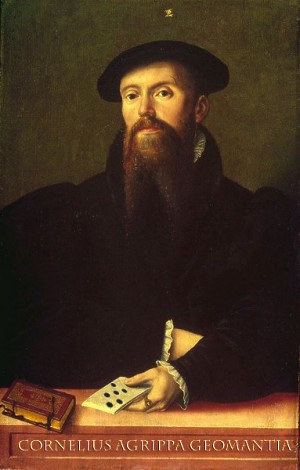CORNELIUS AGRIPPA
THE MAGICIAN WHO REJECTED MAGIC

Heinrich Cornelius Agrippa von Nettesheim [1486-1535] was a German theologian, lawyer, soldier, physician astrologer, necromancer and alchemist. He spent his entire life wandering Europe and studying 'The Natural Philosophies' but even though he eventually renounced magic his writings influenced studies of the occult for centuries.
Agrippa was born in Cologne and later attended the city's university. After studying with Johannes Trithemius, another unorthodox theologian and occultist, Agrippa accepted a teaching position at the University of Dole, then a free city in Hapsburg Burgundy. Always controversial, Agrippa was forced to abandon the Academic world when his enemies accused him of being a 'Judaizing Heretic'. In 1511 he sought refuge in the armies of the Holy Roman Emperor and fought in Spain and Italy before returning to civilian life . In 1520 Agrippa became legal adviser to the Council of Metz, another imperial city but despite earning a reputation as a brilliant lawyer, he was forced to resign after he successfully defended a man accused of heresy and a woman accused of witchcraft.
Undaunted, Agrippa moved to Grenoble to study medicine and later he accepted a position as Physician & Astrologer to the Queen of France. Unfortunately the constant wars between France and The Empire meant Agrippa soon lost favour at the French court and he was forced to move to Antwerp where he was reduced to selling magical talismans and alchemical gold to make ends meet. Eventually Agrippa returned to Grenoble where he renounced his beliefs in the occult and though the sincerity of this retraction has been called into question by recent scholars, he was spared the imprisonment and torture suffered by many who challenged the perceived wisdom of the times. The accusations of heresy may have continued but Agrippa died peacefully in 1535.
Agrippa's most important work De Occulta Philosophia is still in print today and his name is mentioned in both Mary Shelley's Frankenstein and JK Rowling's Harry Potter stories. He's also the inspiration for the fictional Thomas Devilstone whose own career is closely entwined with that of this famous philosopher and magician.
Agrippa's retraction:
"But of magic I wrote whilst I was very young three large books, which I called Of Occult Philosophy, in which what was then through the curiosity of my youth erroneous, I now being more advised, am willing to have retracted, by this recantation; I formerly spent much time and costs in these vanities. At last I grew so wise as to be able to dissuade others from this destruction. For whosoever do not in the truth, nor in the power of God, but in the deceits of devils, according to the operation of wicked spirits presume to divine and prophesy, and practising through magical vanities, exorcisms, incantions [sic] and other demoniacal works and deceits of idolatry, boasting of delusions, and phantasms, presently ceasing, brag that they can do miracles, I say all these shall with Jannes, and Jambres, and Simon Magus, be destinated to the torments of eternal fire."